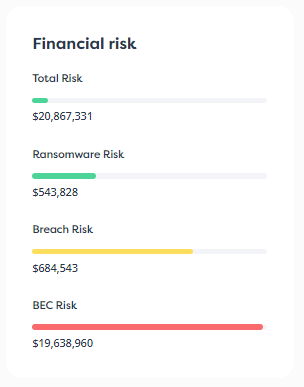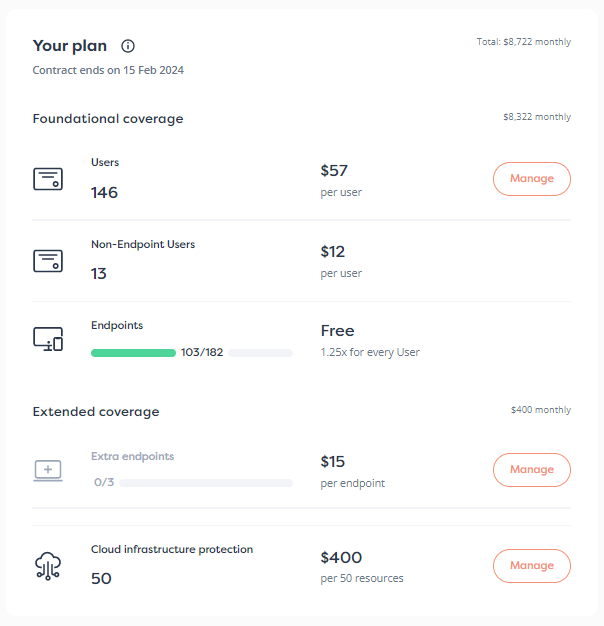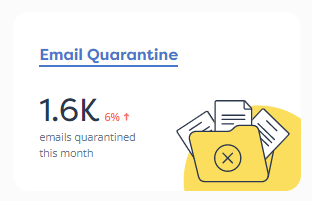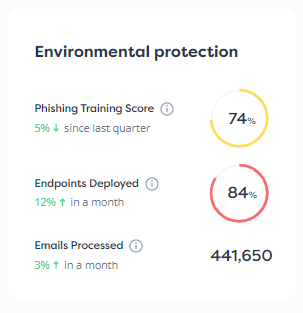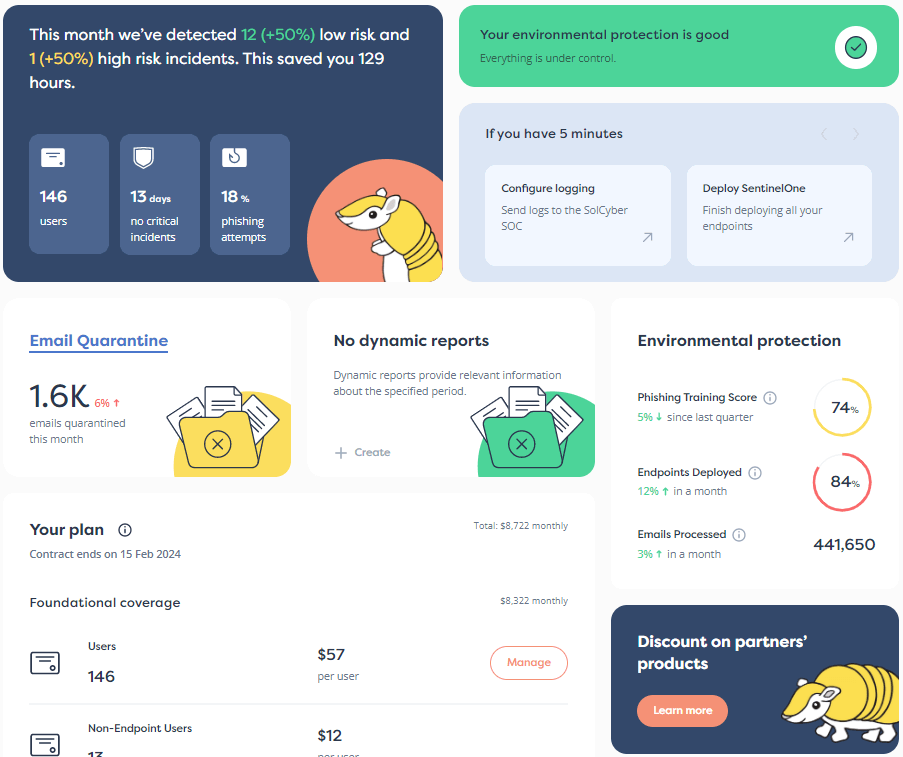As a small business, you probably think you’re small potatoes to hackers. Unfortunately, the opposite can often be true. Smaller businesses that are part of supply chains are frequently chosen by hackers because they are an easy target as a valuable foot in the door to a substantially larger company. In fact, in 2022, businesses reported that about 1 in 5 data breaches came from a supplier.
You want to be seen as an asset to the companies you serve, not a potential risk. So what can you do to protect yourself? In this article, we’ll talk about the importance of supply chain security and the steps you can take immediately to keep your business safe.
Cybersecurity threats to supply chains
Supply chains are facing increased cybersecurity attacks
One of the reasons supply chain attacks have increased over the past few years is that hackers are seeing suppliers as a “back door” to other organizations. From July to December 2021, attacks on the supply chain increased by 51%. Because of this, organizations are prioritizing security budgets dedicated to protecting against risks from suppliers and third parties. Even though that proactivity is a positive, it speaks to the importance of being proactive as a business in the supply chain. Your organization needs to think about what it can do to maintain trust, protect data, and improve peace of mind with your customers and potential partners.
The global supply chain can be a crowded and messy place, making it hard to keep track of security problems and software vulnerabilities. One vulnerability of an open-source software, Log4j, caused panic as developers worked to quickly patch the bug before it was exploited. Even now, however, Log4j instances may have issues and risks. More alarming, 64% of organizations say they are not equipped to stop a supply chain attack coming from a software supplier that has been compromised.
Small exploits in open-source software, social engineering, or brute force attacks could lead to a larger infiltration down the line. You may be familiar with some recent high-profile attacks, including the SolarWinds 2020 hack that led to about 18,000 customers downloading malicious code, compromising an estimated 100 companies, as well as about a dozen government agencies. In another instance, the Colonial Pipeline hack affected a wide swath of everyday people, leading to both real and perceived gas shortages, the latter caused by the frenzied post-announcement. Additionally, there are many more supply chain hacks happening on a regular basis that don’t get covered as widely.
Hackers know the value of targeting supply chains
Because supply chain attacks can connect so many different companies, hackers know that finding a vulnerability and exploiting it can wreak more widespread damage.
The software development supply chain used by SolarWinds was compromised by a breach likely coming from a Russian hacking group called “Turla,” which operates on behalf of Russia’s official security service, FSB. While the breach affected network management software, the consequences could have been much larger – there are signs that more government and commercial targets may have been planned as part of the attack.
A recent Uber hack started with a third-party employee accepting a two-factor login request from someone who had the individual’s compromised password. That’s all it took to open the door to other employee accounts, G-Suite and Slack permissions, as well as internal files and code.
The risk supply chains face
According to IBM’s Cost of a Data Breach 2022 report, it takes an average of 235 days to identify and 68 days to contain a supply chain compromise. This presents an advanced persistent threat (APT) – a time period when an intruder is present in a network and continues to gain access to more and more sensitive data. Once cybercriminals gain entry, they’ll use techniques like password cracking to gain administrator rights and move more freely throughout the network. Hackers might even leave, but keep a backdoor open in case they need to return for more information.
In the case of breaches like Uber, sensitive data doesn’t have to be compromised to pose a significant risk to your business. A data breach is a risk in and of itself. Why is that the case?
First, security compromises can bring your compliance into question. If you’re not holding up your regulatory commitments, your business might incur costly fines. After a critical breach, Equifax has been ordered to pay at least $575 million in regulatory fees for failing to secure its network.
A data breach can also cause business continuity interruptions. Time and resources can be taken away from business processes in order to locate and contain a breach. Attacks can also lead to key pieces of data that are central to daily operations becoming lost or irretrievable, setting back orders or operations for days, weeks, or longer.
Worst of all, a supply chain attack can put you at risk of losing customers. Whether you lose their data, fail to deliver a service or product on time, or just shake their confidence in your security, your standing with customers can be placed in jeopardy.
Service interruption can be much more critical for supply chains
These interdependent links can have a ripple effect felt by more than just one company. For example, if a cloud database provider goes down, it can result in hundreds, or even thousands, of websites shutting down. A payment processor could stop multiple websites that use the same tool from processing or accepting orders, grinding the checkout to a halt. Even a small exposure, such as the mobile device of one worker, can lead to multiple companies being hacked or breached.
In short, these service interruptions can lead to losses of customers, revenue, or even the business itself.
What supply chains can do
While all of this sounds pretty grim, don’t fret just yet! It’s not all doom and gloom. As part of the supply chain, it’s important to take proactive measures to ensure business continuity, build trust, and prevent attacks before an infiltration occurs.
Customers and regulators alike are increasing their focus on assessing the cybersecurity of supply chains. By demonstrating robust security, resilience competence, and well-defined subsequent measures, you can retain customers and even set your business apart from the competition that may not be as well-versed.
Have a clear incident response plan – including communication
Even with the best-laid plans, data breaches and compromises may still happen. While you can put any number of proactive measures in place, new vulnerabilities pop up all the time. What’s key in these moments is demonstrating how quickly you’re able to recover from a compromising incident.
Second to this is how effectively you can communicate the details of the breach and the steps you took after discovering it to keep affected customers safe. This level of transparency can be the difference between keeping or losing a contract.
Consider an managed security partner such as SolCyber
Most importantly, you don’t have to go it alone. Working with a modern managed security service provider (MSSP) can help improve your security posture, become more resilient, and focus less on the operational nitty-gritty of your business. SolCyber can help you become more cyber resilient with our managed security services that make cybersecurity as easy as binging on your favorite streaming platform.
Are you ready to strengthen your link in the supply chain? Reach out today!
FAQ about Supply Chain Cybersecurity
- Are supply chains at risk for cybersecurity attacks?
- Yes – the risk for supply chains is present and on the rise. Attacks on the supply chain increased by 51% between July and December 2021. In 2022, almost 1 in 5 data breaches came from a supplier.
- What’s an example of a supply chain attack?
- Supply chain attacks can start with any vulnerability, such as a third-party employee accepting a two-factor login request they didn’t initiate, as in the case of a recent Uber hack. After gaining entry, the hacker had access to employee accounts, Slack and G-suite permissions, as well as internal code and files.
- Why are hackers attacking supply chains?
- Suppliers are often seen as a “back door” to other organizations, making them a prime target for cybersecurity attacks. Because supply chain attacks can serve as a connection to other companies, hackers know that exploiting vulnerabilities can lead to more widespread access.
- What happens if a supply chain is attacked by a hacker?
- Supply chain hacks can affect any businesses that are attached to the original company that was targeted. These attacks can slow down or stop business operations, lead to lost revenue or trust in the company, tack on fees and penalties for compliance issues, and may even shut down a business altogether.
- How can supply chains defend themselves against cyber attacks?
- Prioritizing cybersecurity and cyber resilience, having a clear incident response plan should an attack occur, and employing the help of an MSSP are all measures supply chains can take to defend against attacks and the subsequent fallout of hacks.























